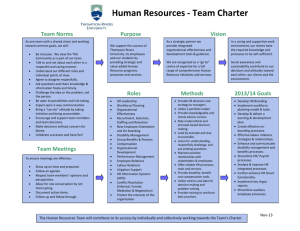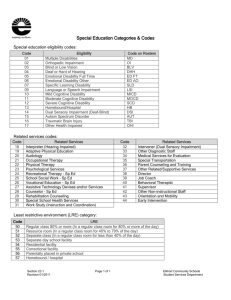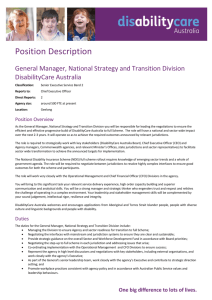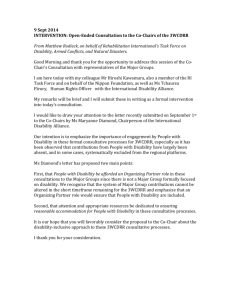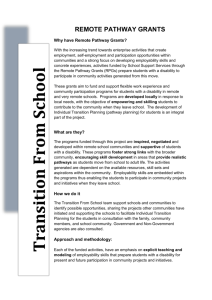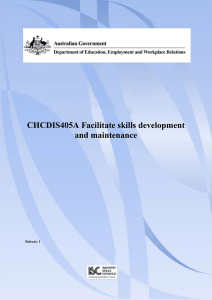J Meagher
advertisement
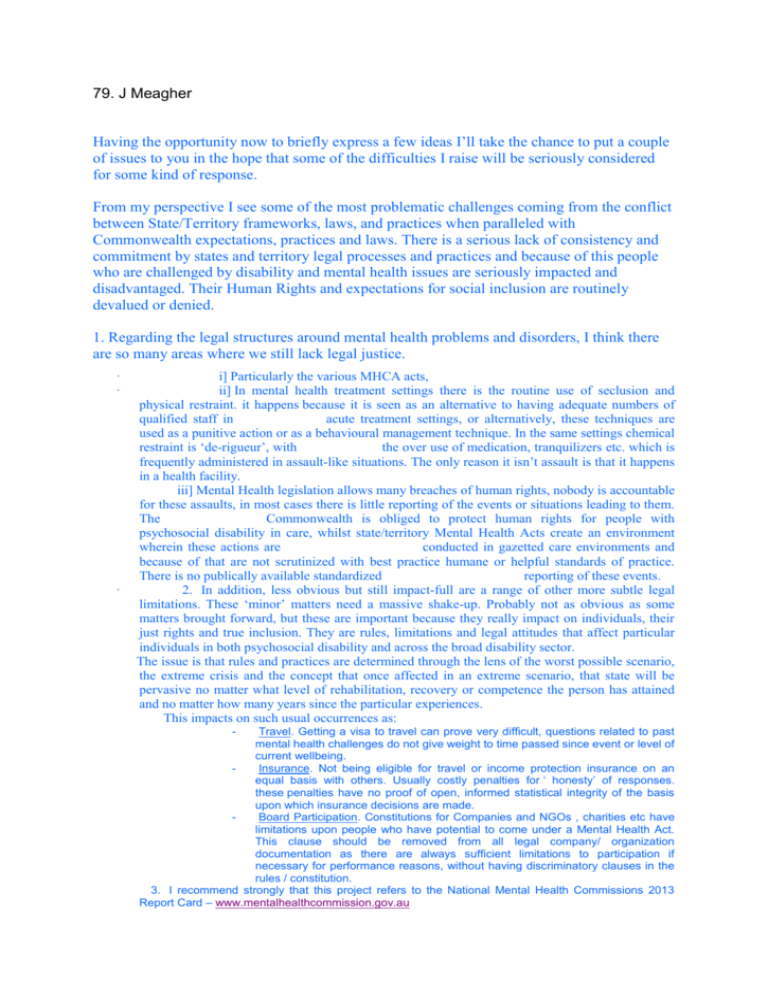
79. J Meagher Having the opportunity now to briefly express a few ideas I’ll take the chance to put a couple of issues to you in the hope that some of the difficulties I raise will be seriously considered for some kind of response. From my perspective I see some of the most problematic challenges coming from the conflict between State/Territory frameworks, laws, and practices when paralleled with Commonwealth expectations, practices and laws. There is a serious lack of consistency and commitment by states and territory legal processes and practices and because of this people who are challenged by disability and mental health issues are seriously impacted and disadvantaged. Their Human Rights and expectations for social inclusion are routinely devalued or denied. 1. Regarding the legal structures around mental health problems and disorders, I think there are so many areas where we still lack legal justice. · · · i] Particularly the various MHCA acts, ii] In mental health treatment settings there is the routine use of seclusion and physical restraint. it happens because it is seen as an alternative to having adequate numbers of qualified staff in acute treatment settings, or alternatively, these techniques are used as a punitive action or as a behavioural management technique. In the same settings chemical restraint is ‘de-rigueur’, with the over use of medication, tranquilizers etc. which is frequently administered in assault-like situations. The only reason it isn’t assault is that it happens in a health facility. iii] Mental Health legislation allows many breaches of human rights, nobody is accountable for these assaults, in most cases there is little reporting of the events or situations leading to them. The Commonwealth is obliged to protect human rights for people with psychosocial disability in care, whilst state/territory Mental Health Acts create an environment wherein these actions are conducted in gazetted care environments and because of that are not scrutinized with best practice humane or helpful standards of practice. There is no publically available standardized reporting of these events. 2. In addition, less obvious but still impact-full are a range of other more subtle legal limitations. These ‘minor’ matters need a massive shake-up. Probably not as obvious as some matters brought forward, but these are important because they really impact on individuals, their just rights and true inclusion. They are rules, limitations and legal attitudes that affect particular individuals in both psychosocial disability and across the broad disability sector. The issue is that rules and practices are determined through the lens of the worst possible scenario, the extreme crisis and the concept that once affected in an extreme scenario, that state will be pervasive no matter what level of rehabilitation, recovery or competence the person has attained and no matter how many years since the particular experiences. This impacts on such usual occurrences as: - Travel. Getting a visa to travel can prove very difficult, questions related to past mental health challenges do not give weight to time passed since event or level of current wellbeing. Insurance. Not being eligible for travel or income protection insurance on an equal basis with others. Usually costly penalties for ‘ honesty’ of responses. these penalties have no proof of open, informed statistical integrity of the basis upon which insurance decisions are made. Board Participation. Constitutions for Companies and NGOs , charities etc have limitations upon people who have potential to come under a Mental Health Act. This clause should be removed from all legal company/ organization documentation as there are always sufficient limitations to participation if necessary for performance reasons, without having discriminatory clauses in the rules / constitution. 3. I recommend strongly that this project refers to the National Mental Health Commissions 2013 Report Card – www.mentalhealthcommission.gov.au Where the chapter “Feeling Safe, Stable and Secure” emphasizes the inequities that people living with mental health difficulties face when coming into contact with legal and justice systems, e.g. in NSW juvenile detention centres, 80% of young people have at least one mental health problem, whereas if the detainee is Indigenous, the rate is 90%. The ALRC should consider all relevant Commonwealth laws and legal frameworks that either directly, or indirectly, impact on the recognition of people with disability before the law and their exercise of legal capacity on an equal basis with others. Regards Janet Meagher AM






